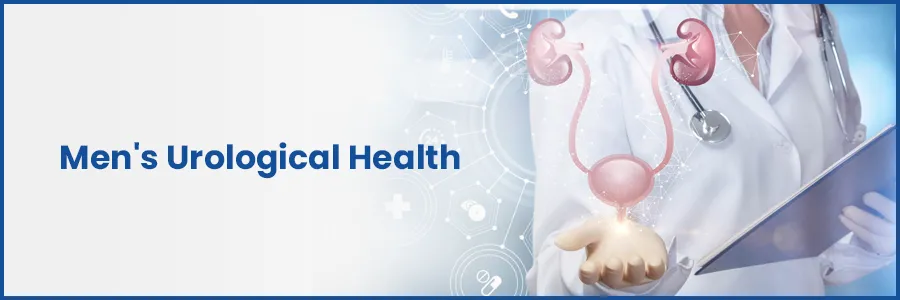- Cardiology 84
- Dermatology 45
- Endocrinology 33
- ENT 16
- Fertility 190
- Gastroenterology 78
- General-Medicine 81
- Gynecology 80
- Hematology 19
- Infectious-Diseases 33
- Neurology 52
- Oncology 34
- Ophthalmology 23
- Orthopedics 69
- Pediatrics 31
- Procedure 23
- Public-Health 144
- Pulmonology 59
- Radiology 8
- Urology 68
- Wellness 161
- Woman-and-child 77

Men's Urological Health: Erectile Dysfunction & Low Testosterone
Men's health often involves sensitive issues like erectile dysfunction and low testosterone, which many find difficult to discuss. These conditions are common and affect many men. This guide aims to clarify these issues, detailing their symptoms, causes, and treatments.
What is Erectile Dysfunction (ED)?
Erectile dysfunction (ED) is the persistent inability to achieve or maintain an erection firm enough for sexual activity. It's not a temporary issue but a long-term problem that can affect a man's self-esteem, relationships, and overall quality of life.
Erectile Dysfunction Causes
- Physical Causes: Includes heart disease, diabetes, hypertension, and obesity.
- Psychological Causes: Stress, anxiety, depression, and other emotional factors.
- Lifestyle Factors: Smoking, excessive alcohol consumption, and lack of exercise.
Erectile Dysfunction Treatment
- Medication: Prescription drugs like Viagra and Cialis are commonly used.
- Lifestyle Changes: Adopting a healthy diet, exercising regularly, and quitting smoking can help.
- Counseling: Therapy can address underlying emotional issues contributing to ED.
- Surgical Options: For severe cases, procedures such as penile implants may be recommended.
What is Low Testosterone?
Low testosterone (Low T) refers to lower than normal levels of testosterone, which naturally declines with age. Low T affects not just sexual function but also muscle mass, bone density, and overall energy levels.
Low Testosterone Causes
- Aging: Testosterone levels typically decrease after age 30.
- Hormonal Disorders: Conditions like hypothyroidism can impact testosterone production.
- Chronic Diseases: Diseases such as type 2 diabetes and kidney disease can lead to Low testosterone.
Ready to take control of your health journey? Book your appointment now and start your path towards wellness today!
Book an AppointmentSymptoms of Low Testosterone
- Fatigue: Persistent tiredness despite adequate sleep.
- Loss of Muscle Mass: Reduced strength and muscle tone.
- Sexual Dysfunction: Includes decreased sexual desire and performance.
- Mood Changes: Increased irritability, depression, or anxiety.
Low Testosterone Treatment
- Testosterone Replacement Therapy (TRT): Includes injections, gels, or patches to restore testosterone levels.
- Lifestyle Modifications: Regular exercise, a balanced diet, and proper sleep can enhance natural testosterone production.
- Medication Management: Treating underlying health conditions that may contribute to Low Testosterone .
Conclusion
Addressing men's urological health issues like erectile dysfunction and low testosterone is crucial. Increased understanding, awareness, and open discussions can significantly improve outcomes.
If you or someone you know is experiencing these issues, consulting a urologist can provide effective, personalized treatment plans.
Frequently Asked Questions
While the risk of ED does increase with age, it is not an inevitable part of aging. Many men enjoy healthy sexual function well into their older years. Lifestyle, underlying health conditions, and psychological factors can all contribute to ED.
Yes, low testosterone levels can impact other areas of health, such as muscle mass, bone density, energy levels, mood, and overall well-being.
OTC treatments for ED may not be safe or effective and could even be harmful. It's essential to consult with a healthcare provider for an appropriate diagnosis and treatment plan tailored to your specific situation.
TRT may not be suitable for everyone with low testosterone. There are potential risks and side effects associated with TRT, and it requires careful monitoring by a healthcare provider. A comprehensive evaluation is needed to determine the best treatment approach.
Symptoms of low testosterone and ED can vary among individuals. If you experience any symptoms like fatigue, decreased sexual desire, trouble maintaining an erection, or mood changes, it's advisable to consult a healthcare provider specializing in urology.

- Cardiology 2132
- Dermatology 168
- Endocrinology 135
- ENT 97
- Fertility 217
- Gastroenterology 232
- General 478
- General-Medicine 1685
- Gynecology 169
- Hematology 85
- Infectious-Diseases 208
- Neurology 207
- Oncology 345
- Ophthalmology 65
- Orthopedics 187
- Pediatrics 83
- Procedure 72
- Public-Health 209
- Pulmonology 126
- Radiology 13
- Second Opinion 311
- Urology 294
- Wellness 600
- Woman-and-child 447
- Others 10217
Related Blogs
If you have any questions, please fill out the enquiry form or call us, and we will get back to you promptly.
040-68334455